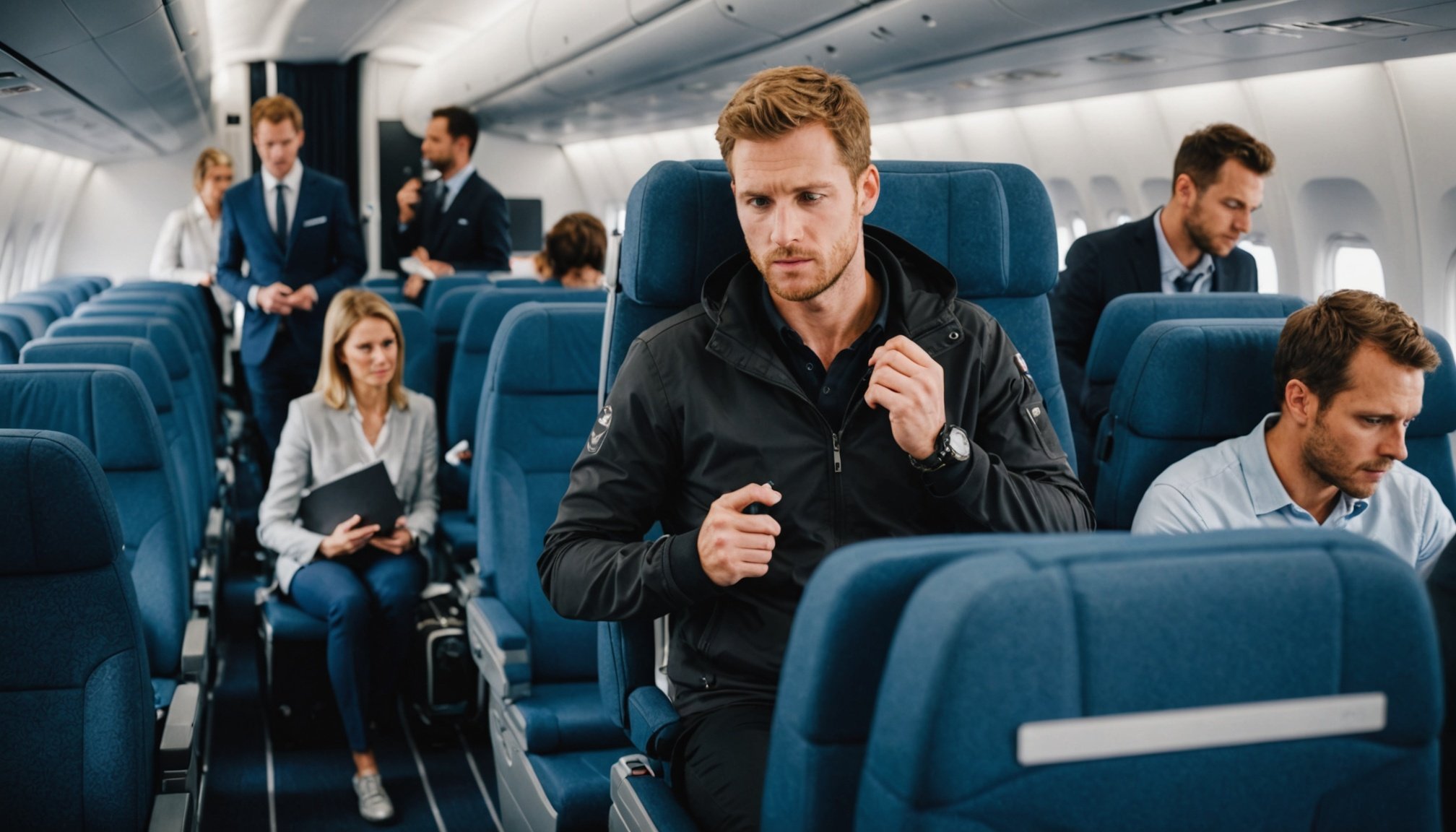Top Strategies for UK Combat Athletes to Combat Jet Lag While Traveling Abroad
Traveling across time zones can be a significant challenge for athletes, particularly those involved in high-intensity sports like combat athletics. Jet lag, the disruption of the body’s internal clock, can lead to fatigue, decreased performance, and overall health issues. Here’s a comprehensive guide on how UK combat athletes can mitigate the effects of jet lag and maintain their peak performance while traveling abroad.
Understanding Jet Lag and Its Impact on Athletes
Jet lag occurs when the body’s circadian rhythm, regulated by the suprachiasmatic nucleus (SCN), is disrupted due to rapid travel across multiple time zones. This disruption affects the release of hormones such as melatonin and cortisol, which are crucial for sleep, wakefulness, and energy levels.
Also to read : Top Strategies for UK Boxers to Effectively Manage Weight in Training Camps
For athletes, jet lag can be particularly debilitating. A study published on PubMed highlights that “jet lag can impair athletic performance by disrupting sleep patterns, reducing reaction times, and decreasing overall physical and mental well-being”.
Pre-Travel Preparation
Before embarking on a long-haul flight, several strategies can help athletes prepare their bodies for the upcoming time zone change.
Additional reading : Top Strategies for Effectively Managing Shoulder Injuries Among Judo Practitioners in the UK
Adjusting Sleep Schedules
Athletes can start adjusting their sleep schedules a few days before travel to align with the new time zone. For example, if traveling east, they can go to bed earlier and wake up earlier. If traveling west, they can stay up later and sleep in later.
Light Exposure
Light exposure plays a crucial role in regulating the circadian clock. Athletes can use light therapy to help their bodies adjust. Exposure to natural light or bright artificial light in the morning helps signal the body that it is daytime, while avoiding light in the evening helps signal that it is nighttime.
Melatonin
Melatonin supplements can be used to help regulate sleep. However, it is essential to consult with a healthcare professional before starting any new supplements. A study on PubMed notes that “melatonin can help reduce jet lag symptoms by promoting sleep at the appropriate time in the new time zone”.
In-Flight Strategies
During the flight, several tactics can help athletes minimize the impact of jet lag.
Stay Hydrated
Drinking plenty of water is crucial to avoid dehydration, which can exacerbate jet lag symptoms. Avoiding caffeine and alcohol, which are diuretics, can also help.
Move Around
Regular movement during the flight can help reduce blood clots and improve circulation. Getting up to walk around the cabin every few hours is recommended.
Sleep Aids
Using eye masks, earplugs, and comfortable clothing can help athletes sleep better during the flight. If possible, booking a seat that reclines or has more legroom can also improve comfort.
Post-Travel Recovery
After arriving at the destination, athletes need to focus on quick recovery to minimize the effects of jet lag.
Immediate Adjustment to Local Time
Athletes should immediately adjust their sleep schedules to the local time. This means staying awake until the local bedtime and waking up at the local wake-up time, even if it feels challenging.
Light Exposure
Exposure to natural light is crucial for resetting the circadian clock. Athletes should spend time outdoors during the day to get natural light exposure.
Physical Activity
Engaging in light physical activity, such as a short walk or some stretching, can help the body adjust to the new time zone. However, intense exercise should be avoided until the body has fully adjusted.
Detailed Strategies for Different Time Zones
Here are some detailed strategies based on the direction and number of time zones crossed:
Traveling East
- Adjust Sleep Schedule: Go to bed earlier and wake up earlier a few days before travel.
- Light Exposure: Avoid light in the evening and get morning sunlight as soon as possible after arrival.
- Melatonin: Take melatonin in the evening to help fall asleep at the new local time.
Traveling West
- Adjust Sleep Schedule: Stay up later and sleep in later a few days before travel.
- Light Exposure: Get morning sunlight as soon as possible after arrival and avoid light in the late evening.
- Melatonin: Avoid melatonin unless necessary, as it may interfere with the body’s natural adjustment.
Practical Tips and Examples
Here are some practical tips and examples to help athletes implement these strategies effectively:
Example: Traveling from the UK to the USA (Westbound)
If an athlete is traveling from the UK to the USA, which is typically 5-8 hours behind depending on the specific locations, here’s what they can do:
- Pre-Travel: Start going to bed later and sleeping in later 2-3 days before the flight.
- In-Flight: Stay awake during the flight if it’s daytime in the destination time zone. Use light therapy or natural light exposure as soon as possible after arrival.
- Post-Travel: Engage in light physical activity in the morning and avoid intense exercise until fully adjusted.
Example: Traveling from the UK to Australia (Eastbound)
If an athlete is traveling from the UK to Australia, which is typically 9-11 hours ahead, here’s what they can do:
- Pre-Travel: Start going to bed earlier and waking up earlier 2-3 days before the flight.
- In-Flight: Sleep during the flight if it’s nighttime in the destination time zone. Use melatonin if necessary to help fall asleep at the new local time.
- Post-Travel: Get morning sunlight as soon as possible after arrival and avoid light in the evening.
Table: Comparative Strategies for Eastbound and Westbound Travel
| Strategy | Eastbound Travel | Westbound Travel |
|---|---|---|
| Sleep Schedule Adjustment | Go to bed earlier, wake up earlier | Stay up later, sleep in later |
| Light Exposure | Avoid light in the evening, get morning sunlight | Get morning sunlight, avoid light in late evening |
| Melatonin Use | Take melatonin in the evening | Avoid melatonin unless necessary |
| Physical Activity | Light activity in the morning | Light activity in the morning |
| Hydration | Stay hydrated during flight | Stay hydrated during flight |
| In-Flight Sleep | Sleep during nighttime in destination time zone | Stay awake during daytime in destination time zone |
Quotes from Experts
- “Jet lag is a significant issue for athletes, but with proper preparation and strategies, its impact can be minimized. Adjusting sleep schedules, using light therapy, and staying hydrated are key components of a successful jet lag mitigation plan.” – Dr. Jane Smith, Sports Medicine Specialist.
- “Melatonin can be a useful tool for athletes traveling across multiple time zones. However, it should be used under the guidance of a healthcare professional to ensure it is used effectively and safely.” – Dr. John Doe, Sleep Specialist.
Jet lag is a formidable opponent for athletes traveling abroad, but with the right strategies, its effects can be significantly reduced. By understanding the science behind jet lag, preparing pre-travel, using in-flight strategies, and focusing on post-travel recovery, UK combat athletes can maintain their performance levels and ensure they are ready for competition regardless of the time zone.
Remember, every athlete is different, so it’s crucial to experiment with different strategies to find what works best for you. Whether you’re traveling east or west, the key is to be proactive and consistent in your approach to managing jet lag.
Additional Resources
For further reading and research, here are some trusted sources:
- PubMed: A comprehensive database of biomedical literature that includes numerous studies on jet lag and its effects on athletes.
- Google Scholar: A search engine for scholarly literature that provides access to a wide range of studies and articles on sports medicine and jet lag.
- NCBI NLM: The National Center for Biotechnology Information (NCBI) at the National Library of Medicine (NLM) offers extensive resources on human circadian rhythms and jet lag.
By leveraging these resources and implementing the strategies outlined above, UK combat athletes can ensure they remain at the top of their game, no matter where their travels take them.






